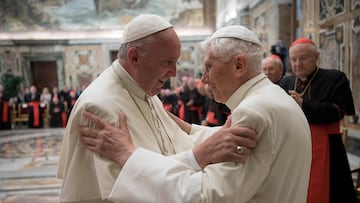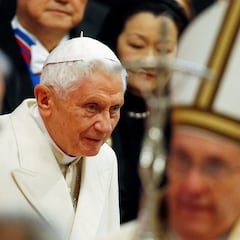What did Pope Benedict XVI do in his last years? What is the job of a Pope Emeritus?
The controversies surrounding Pope Benedict XVI and Pope Francis have always been alive. But what exactly is the Pope Emeritus’s job?

Pope Benedict XVI became the first pope in modern times and the first in over 600 years to retire, in February 2013. While that meant the world would have two Popes alive, it also meant he would not be the acting Pope.
Instead, Benedict XVI has since become Pope Emeritus, a title that acknowledges his existence and tenure as a living and former head of the Church. The term emeritus, derived from Latin, usually refers to male retirees who have retained the respective title of their last held role (as per Merriam-Webster).
Scenes of pilgrims entering St. Peter’s Basilica to pay their respects to Pope Emeritus Benedict XVI. pic.twitter.com/nvY3zIHLCl
— Vatican News (@VaticanNews) January 2, 2023
In a religious sense, a Pope Emeritus doesn’t have a job description. And because Benedict was the first Pope to voluntarily resign since Celestine V in 1294, what was expected from him and the title is still evolving.
During his last years, Benedict XVI has led a largely quiet life in Vatican City but has also put himself to work on some matters that has caused ripples in the church.
Related:
- Former Pope Benedict XVI live updates: Vatican and Pope Francis share news on worsening health
- The controversies that surrounded Benedict XVI during his papacy: abuse, homosexual marriage…
- Why did Benedict XVI choose that name when he was elected pope? What does it mean
- “The Two Popes’', the film about Benedict XVI and Pope Francis: where to watch it
What has Benedict XVI done in the last few years?
Related stories

Former Pope Benedict XVI: latest news
The 95-year-old co-authored a book in 2020, From the Depths of Our Hearts, making a forceful case for the necessity of celibacy in the priesthood, around the same time Pope Francis openly considered the possibility of allowing some married men to be ordained.
In a religious sense, Benedict potentially undermined the current pope’s decision that he was actively deliberating on, which created more controversy that led to more division among Catholics.

